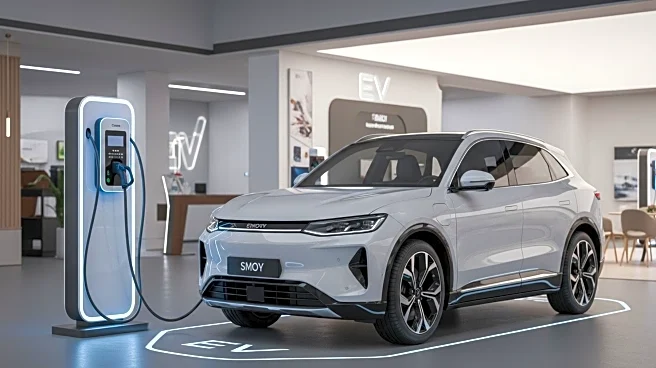What's Happening?
General Motors (GM) has reported its strongest U.S. market share in a decade, capturing 17.2 percent of the new car market in 2025. This achievement is driven by a surge in sales of electric vehicles (EVs) and SUVs. GM sold 2.2 million vehicles in the first nine months of the year, marking a 10 percent increase from the previous year. Notable performers include the Chevrolet Equinox EV, which saw a 156.7 percent increase in September sales, and the Silverado EV, which experienced a 78.6 percent rise in demand. Cadillac and Chevrolet also reported significant sales growth, while Buick faced challenges with a 14 percent decline in September sales.
Why It's Important?
GM's success in increasing its market share highlights the growing consumer demand for electric vehicles and SUVs, reflecting broader trends in the automotive industry towards sustainability and innovation. The company's ability to capitalize on these trends positions it as a leader in the transition to electric mobility. However, the decline in Buick's sales underscores the challenges faced by traditional brands in adapting to changing market dynamics. GM's performance is significant for the U.S. automotive industry, as it demonstrates the potential for growth through strategic investments in EV technology and product diversification.
What's Next?
GM is likely to continue focusing on expanding its electric vehicle lineup and enhancing its SUV offerings to maintain its competitive edge in the U.S. market. The company may also explore strategies to address the sales decline in its Buick brand, potentially through product innovation or marketing efforts. As the automotive industry evolves, GM's ability to adapt to consumer preferences and regulatory changes will be crucial in sustaining its market position.
Beyond the Headlines
The rise in GM's market share may have implications for the broader automotive industry, as it highlights the importance of investing in electric vehicle technology and sustainable practices. GM's success could encourage other automakers to accelerate their transition to electric mobility and explore new market opportunities. Additionally, the company's performance may influence public policy discussions on automotive emissions and environmental standards.









